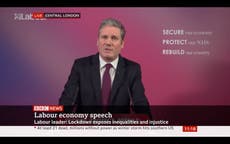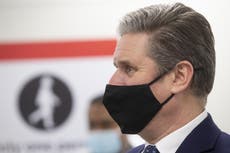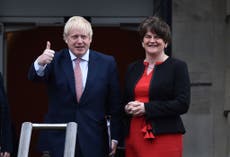Was this a ‘major’ political speech by Keir Starmer? You really wouldn’t have guessed
After a very long wait, Britain is back to having two major political parties, offering more or less the same thing

Your support helps us to tell the story
From reproductive rights to climate change to Big Tech, The Independent is on the ground when the story is developing. Whether it's investigating the financials of Elon Musk's pro-Trump PAC or producing our latest documentary, 'The A Word', which shines a light on the American women fighting for reproductive rights, we know how important it is to parse out the facts from the messaging.
At such a critical moment in US history, we need reporters on the ground. Your donation allows us to keep sending journalists to speak to both sides of the story.
The Independent is trusted by Americans across the entire political spectrum. And unlike many other quality news outlets, we choose not to lock Americans out of our reporting and analysis with paywalls. We believe quality journalism should be available to everyone, paid for by those who can afford it.
Your support makes all the difference.Breathe out. Relax. It’s all over. Things, finally, are back to normal. The old times and good times have returned. At last, after a very long wait, Britain is back to having two major political parties, offering more or less the same thing, but saying they’ll do it better than the other.
This, probably, is not what Keir Starmer wanted the message to be from his “major” political speech, which we were told beforehand was the most important of his leadership so far – and it’s just as well we were.
But it’s no bad thing. This is how it’s meant to be. Working out what’s wrong with the country and pledging to sort it out is how politics is meant to operate, before it was swept away and replaced by the competing dystopian fantasy worlds of Brexit and Jeremy Corbyn.
For his big relaunch, Starmer was standing on his own in Labour headquarters, deprived of the small, rather bored audience that would otherwise have been there. His new slogan, to be found on the lectern in front of him, was: “Secure. Protect. Rebuild.” Boris Johnson’s, you may recall, is: “Build Back Better.”
“We know what the Conservatives want to do,” Starmer said. “They want to build back. But I don’t want to go back.”
No, he doesn’t want to build back. He wants to rebuild. And that’s completely different.
Starmer thinks there’s a mood in the air, in the country, like there was in 1945. “It’s the determination that our collective sacrifice must lead to a better future,” he said. Unfortunately for him, there wasn’t just a mood in the air in 1945, there was also a legal requirement to hold a general election, which this time round isn’t coming for three and a half years, when whatever mood is in the country now will be a distant memory.
Not least as Boris Johnson is saying exactly the same thing, and has been for some time. That he’s going to “level up” the country, with new schools and hospitals and police officers and so on and so forth. Whether he’s done it, or will do it, and not just said it, is now the only question that will matter in the long years ahead.
In this sense, if the speech did anything, it was as a favour to political pundits and to voters. The next three and a half years of UK politics should be fought on terms that will be blessedly easy to understand.
A potted history: in 2010, David Cameron, but mainly George Osborne, calculated that the route out of economic difficulty was austerity and, in an ingenious twist, it could be done by hitting the very poorest the very hardest, on the basis that they were only Labour voters anyway, they always would be and it would do them no harm. That is clear evidence of democratic politics not working the way it is supposed to.
But things are very, very different now, mended, in a way, by the madness of the past half decade. Along came Brexit, which created two new political allegiances to which voters felt more strongly aligned than they did to any party, and along came Corbyn, who broke the Cameron/Osborne calculus, by being so repugnant to traditional Labour voters that he lost very large numbers of the seats that could never, in theory, be lost.
It means that Johnson governs with the permission of Labour’s natural supporters, in Sedgefield and Bassetlaw and Bishop Auckland and everywhere else. And Starmer must win them back, which he will do by promising to build back better, but in a better way than Boris Johnson builds back better.
It gives the prime minister three and a half years to come good on his word. Will he do it? Well, Starmer thinks the early signs are not promising. Cutting universal credit, voting down free school meals, and freezing the pay of millions of key workers – this is not how you build back better, he said. Starmer said he would look at what Boris Johnson does, not just listen to what he says.
Though Johnson has made a disastrous mess of handling the pandemic, over-promising and under-delivering, this is not the ordinary Johnsonian way of things. It would be wrong to characterise him as a talker, not a doer.
There is pointless, counterproductive infrastructure all over London as evidence that he likes nothing more than to make things actually happen. The cable car to nowhere, the “Routemaster” buses that don’t work, the fit-for-no-purpose Olympic Stadium, and if he’d only had the authority, a large, mad dysfunctional airport on a reclaimed island in Kent.
There will in the years ahead, most certainly, be genuine, meaningful attempts to keep hold of the Labour supporters whose votes he freely admits he “borrowed” in 2019.
Starmer’s best hope is that Johnson’s best intentions go hopelessly wrong. And that, by no means, is a hopeless proposition.




Join our commenting forum
Join thought-provoking conversations, follow other Independent readers and see their replies
Comments